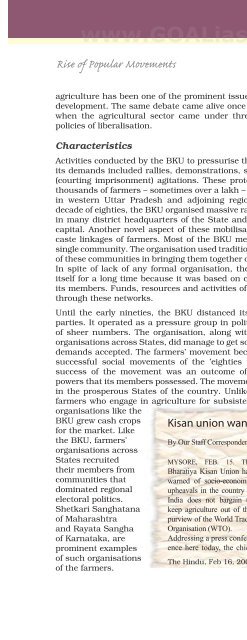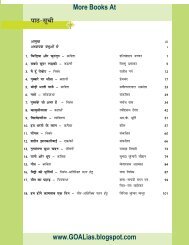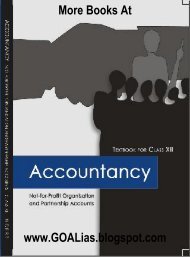t.com www.GOALias.blogspot.com www.GOALias.blogspot.com
t.com www.GOALias.blogspot.com www.GOALias.blogspot.com
t.com www.GOALias.blogspot.com www.GOALias.blogspot.com
- No tags were found...
Create successful ePaper yourself
Turn your PDF publications into a flip-book with our unique Google optimized e-Paper software.
<strong>www</strong>.<strong>GOALias</strong>.<strong>blogspot</strong>.<strong>com</strong>Rise of Popular Movements 135agriculture has been one of the prominent issues in India’s model ofdevelopment. The same debate came alive once again in the eightieswhen the agricultural sector came under threat due to economicpolicies of liberalisation.CharacteristicsActivities conducted by the BKU to pressurise the state for acceptingits demands included rallies, demonstrations, sit-ins, and jail bharo(courting imprisonment) agitations. These protests involved tens ofin western Uttar Pradesh and adjoining regions. Throughout thedecade of eighties, the BKU organised massive rallies of these farmersin many district headquarters of the State and also at the nationalcapital. Another novel aspect of these mobilisations was the use ofcaste linkages of farmers. Most of the BKU members belonged to asingle <strong>com</strong>munity. The organisation used traditional caste panchayatsof these <strong>com</strong>munities in bringing them together over economic issues.In spite of lack of any formal organisation, the BKU could sustainitself for a long time because it was based on clan networks amongits members. Funds, resources and activities of BKU were mobilisedthrough these networks.Until the early nineties, the BKU distanced itself from all politicalparties. It operated as a pressure group in politics with its strengthof sheer numbers. The organisation, along with the other farmers’organisations across States, did manage to get some of their economicdemands accepted. The farmers’ movement became one of the mostsuccessful social movements of the ’eighties in this respect. Thesuccess of the movement was an out<strong>com</strong>e of political bargainingpowers that its members possessed. The movement was active mainlyin the prosperous States of the country. Unlike most of the Indianfarmers who engage in agriculture for subsistence, members of theorganisations like theBKU grew cash cropsfor the market. Likethe BKU, farmers’organisations acrossStates recruitedtheir members from<strong>com</strong>munities thatdominated regionalelectoral politics.Shetkari Sanghatanaof Maharashtraand Rayata Sanghaof Karnataka, areprominent examplesof such organisationsof the farmers.Kisan union wants agriculture out of WTO purviewBy Our Staff CorrespondentMYSORE, FEB. 15. TheBharatiya Kisan Union haswarned of socio-economicupheavals in the country ifIndia does not bargain tokeep agriculture out of thepurview of the World TradeOrganisation (WTO).Addressing a press conferencehere today, the chiefThe Hindu, Feb 16, 2005of the union, MahendraSingh Tikait, and its nationalcoordinating <strong>com</strong>mitteeconvener, M. YudhveerSingh, warned of theimpending dangers if Indiagoes ahead and agreesto the stipulations of theWTO in the next round ofmeeting scheduled to beheld in Hong Kong in November.I havenever met anyonewho says he wishesto be a farmer. Don’twe need farmers inthe country?The leaders said a farmers’rally will be taken out inNew Delhi on March 17to pressure the Governmentto keep agricultureout of the purview of theWTO. More than five lakhfarmers from all over Indiaare expected to attend therally. Subsequently, theagitation will be intensifiedacross the country.
















